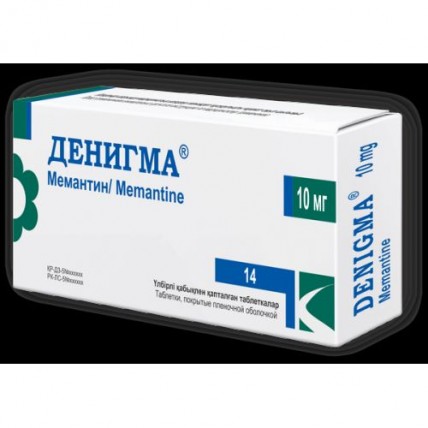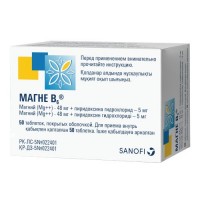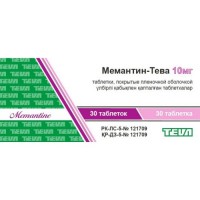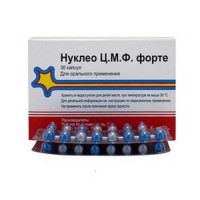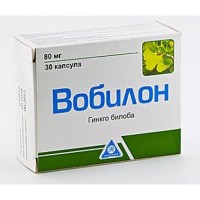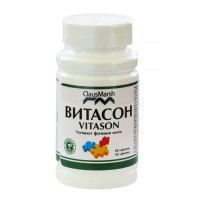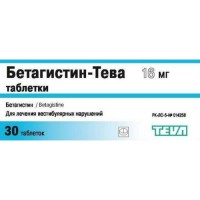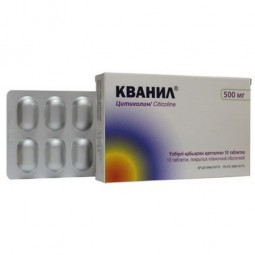Denigma® (Memantine) 10 mg, 14 film-coated tablets
- $16.00
Composition of the medicinal product
One tablet contains the active substance - memantine hydrochloride 10.00 mg,excipients: mannitol 25 C, mannitol SD 200, microcrystalline cellulose PH 102, croscarmellose sodium, povidone K 30, colloidal anhydrous silicon dioxide, magnesium stearate, purified water
composition of the film casing: Opadray 03F84827 pink (hypromellose, titanium dioxide (E 171), polyethylene glycol, talc, iron oxide red (E 172)
Indications for use
- moderate to severe Alzheimer's disease.
List of information required prior to use
Contraindications
- hypersensitivity to the active substance (s) or to any of the excipients
- severe liver dysfunction
- pregnancy and lactation
- children and adolescents up to 18 years old
Necessary precautions for use
Prescribe with caution when:
- epilepsy, predisposition to the development of seizures
- simultaneous use of NMDA receptor antagonists
- the presence of factors that increase the pH of urine (a sharp change in diet, for example, switching to vegetarianism, copious intake of alkaline buffer solutions)
- severe urinary tract infections
- myocardial infarction (history)
- heart failure class III-IV (NYHA classification)
- uncontrolled arterial hypertension.
Interaction with other medicinal products
The simultaneous use of N-methyl-D-aspartate (NMDA) antagonists (amantadine, ketamine or dextromethorphan) should be avoided. These compounds affect the same receptor system as memantine, therefore side effects (mainly related to the central nervous system) may be more frequent or mo
re pronounced. The possible risk of the combination of memantine and phenytoin has also been reported.
The mechanism of action provides for the possible enhancement of the effects of L-dopa, dopaminergic agonists and anticholinergics with the simultaneous use of NMDA antagonists such as memantine. It is possible to weaken the effects of barbiturates and antipsychotics. The joint appointment of memantine and antispasmodics, dantrolene or baclofen can modify their effects and necessitate dose adjustments.
Other drugs such as cimetidine, ranitidine, procainamide, quinidine, quinine, and nicotine, which use the same renal cationic transport system as amantadine, may also interact with memantine and pose a risk of elevated plasma levels.
With the joint appointment of memantine with hydrochlorothiazide or any combination drug that contains hydrochlorothiazide, it is possible to reduce the level of the latter in the blood serum.
It has been reported about isolated cases of increased international normalized ratio (INR) when using memantine in patients taking warfarin. Although a causal relationship has not been established, careful monitoring of prothrombin time or INR is required in patients taking oral anticoagulants concomitantly.
There are no significant interactions between memantine and glyburide / metformin, donepezil or galantamine.
Memantine is not an inhibitor of CYP 1A2, 2A6, 2C9, 2D6, 2E1, 3A, flavin-containing monooxygenase, epoxide hydrolase or sulfathione.
Special warnings
Care should be taken when prescribing the drug to patients with epilepsy, patients with a history of seizure episodes, as well as patients with risk factors for the development of epilepsy.
Several factors causing an increase in urine pH may necessitate close monitoring of the patient. These factors include significant changes in diet, such as replacing a meat-rich diet with a vegetarian or heavy intake of antacid gastric drugs. In addition, urine pH may rise due to a condition of renal tubular acidosis (TPA) or severe urinary tract infections caused by Proteus bacteria.
When prescribing the drug to patients who have recently undergone myocardial infarction, patients with decompensated congestive heart failure (III-IV degree according to the classification of the New York Heart Association), as well as with uncontrolled arterial hypertension, careful monitoring is necessary.
During pregnancy or lactation
There are no data on the effect of memantine when used during pregnancy. Memantine should not be used during pregnancy, unless there is a clear and obvious need.
It is not known whether memantine is excreted in breast milk; however, this may be the case given the lipophilicity of the substance. Women who use memantine should refrain from breastfeeding.
Features of the effect of the drug on the ability to drive a vehicle and potentially dangerous mechanisms
Moderate to severe Alzheimer's disease usually impairs the ability to manage car and work with mechanisms. Moreover, memantine has little to moderate effect on the speed of human reaction, therefore, outpatients should be warned about the need to take special care when driving or working with equipment.
Recommendations for use
Dosage regimen
Treatment should be started and carried out under the supervision of a physician. Therapy should be started only with a guardian or healthcare professional who will monitor the patient's intake of the drug.
The diagnosis should be made in accordance with current guidelines. Tolerance and dose of memantine should be reviewed regularly, preferably within three months after starting treatment. Thereafter, the clinical benefit of memantine and the patient's response to treatment should be regularly assessed in accordance with current clinical guidelines. Maintenance treatment can be continued as long as the therapeutic benefit is favorable and the patient tolerates memantine treatment. Discontinuation of memantine should be considered when evidence of a therapeutic effect is no longer present or the patient is intolerant of treatment.
Adults
The maximum daily dose is 20 mg. In order to reduce the risk of adverse reactions, the maintenance dose is determined by gradually increasing the dose by 5 mg per week for the first 3 weeks as follows:
1st week (1-7 days): take 5 mg (half a tablet) per day for a week;
2nd week (8-14 days): take 10 mg (one tablet) per day for a week;
3rd week (15-21 days): take 15 mg (one and a half tablets) per day for a week;
starting from the 4th week: take 20 mg (2 tablets of 10 mg) per day every day.
The recommended maintenance dose is 20 mg per day.
Elderly patients
The recommended dose for patients over 65 years of age is 20 mg per day (2 tablets of 10 mg 1 time per day), as indicated above.
Patients with impaired renal function
For patients with mild renal impairment (creatinine clearance 50-80 ml / min), a dose reduction is not required. In patients with moderate renal impairment (creatinine clearance 30-49 ml / min), the daily dose should be reduced to 10 mg. The dose can be increased to 20 mg per day according to the standard scheme, if there are no negative reactions, at least after 7 days of treatment. In patients with severe renal insufficiency (creatinine clearance 5-29 ml / min), the daily dose should be reduced to 10 mg.
Patients with impaired liver function
No dose adjustment is required for patients with mild to moderate hepatic impairment (Child-Pugh A, B). The use of memantine is not recommended for patients with severe hepatic impairment.
Application in pediatrics
Memantine is not recommended for use in children and adolescents under the age of 18, due to the lack of data on the safety and effectiveness of its use.
Method and route of administration
For oral administration. The tablets can be used with or without food.
Frequency of application with indication of time of reception
The drug should be used once a day, every day at the same time.
Duration of treatment
The duration of treatment is individually determined by a physician who has experience in the diagnosis and treatment of Alzheimer's disease.
Measures to be taken in case of overdose
Symptoms: fatigue, weakness, anxiety, psychosis, visual hallucinations, provocation, drowsiness, stupor, confusion, loss of consciousness, dizziness, agitation, aggression, hallucinations and gait disturbances, vomiting and diarrhea, coma may develop.
Treatment: In case of overdose, treatment should be symptomatic.
There is no special antidote for intoxication or overdose. Gastric lavage, activated charcoal to prevent potential recirculation in the intestines and liver, acidification of urine, forced diuresis.
When signs and symptoms of general hyperstimulation of the central nervous system appear, symptomatic therapy should be carried out with caution.
Measures required when one or more doses of a drug are missed
If you miss a dose of DENIGMA® tablets, wait and take the next dose at the usual time. Do not take a double dose if you missed the last dose.
Recommendations for seeking advice from a healthcare professional to explain the method of using the medicinal product
Ask your doctor or pharmacist for advice before taking this medicine.
Description of undesirable reactions that manifest themselves with the standard use of the drug and the measures to be taken in this case
Determination of the frequency of side effects is carried out in accordance with the following criteria: very often (? 1/10), often (? From 1/100 to <1/10), infrequently (? From 1/1000 to <1/100), rarely ( ≥ 1/10000 to <1/1000), very rare (<1/10000), unknown (cannot be estimated from available data)
Often
- hypersensitivity to the active substance or to any of the components of the preparation
- drowsiness
dizziness
- imbalance
- hypertension
shortness of breath
constipation
- increase in liver function indicators
- headache
Infrequently
- fungal infections
- confusion of consciousness
- hallucinations
- gait disturbances
- heart failure
- venous thrombosis / thromboembolism
- vomiting
- increased fatigue
Rarely
- convulsions
Frequency unknown
- psychotic reactions
- pancreatitis
- hepatitis
Alzheimer's disease is associated with depression, suicidal tendencies and attempted suicide, which can occur with the use of memantine.
Shelf life - 3 years
Do not use after the expiration date.
Storage conditions
Store in a dry, dark place at a temperature not exceeding 25 ° C.
Keep out of the reach of children!
